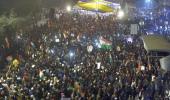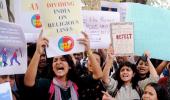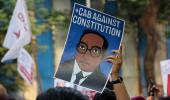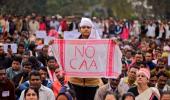'The protests have forced the government to announce that the NRC is not an immediate priority.'
'Even if they are trying to pursue this policy in a different guise, through the NPR, the fact that they have been forced to pause and backtrack at least temporarily shows the positive impact of the protests.'
'Moreover, various state governments have opposed the NPR which cannot be carried out without their cooperation. That is also a success of the protests.'
'The state governments would not have taken this stance against the central government if their hand had not been forced by the popular mood.'
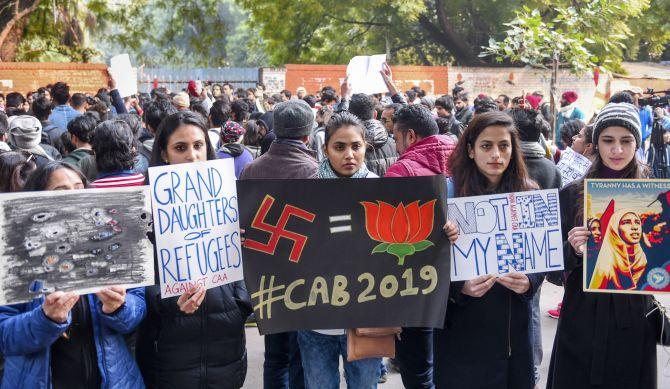
Dr Suvrat Raju is a theoretical physicist on the faculty of the International Centre for Theoretical Sciences in Bengaluru.
Dr Raju, who has a PhD from Harvard, was one of the two winners of the 2019 ICTP Prize in honour of Nobel Laureate Dr Subrahmanyan Chandrasekhar for new insights into the holographic description of black hole interiors and for shedding new light on the long-standing black-hole information paradox.
Dr Raju is among the nearly 2,000 scientists and science students who signed a letter against the Citizenship (Amendment) Act. He was also among the prominent Indian scientists, researchers and academicians from premier institutions such as IITs and IISc who petitioned the government to end the communication shutdown in Kashmir.
"The scale of the protests is remarkable. Even students who were apolitical or may have been previously sympathetic to the government have changed their perspectives. This has changed the discourse and brought back a discussion of many progressive ideas that had taken a backseat, including ideas of secularism, the freedom of speech, and the role of dissent in democracy," Dr Raju tells Rediff.com's Archana Masih.
You have written letters and spoken about some of the government's policies that you are dissatisfied about. What was the reason behind becoming vocal?
The government has recently adopted a number of policies that have made the scientific community increasingly uncomfortable.
This includes the communication shutdown in Kashmir, the passage of the CAA, which we feel is against the founding values of the country, and most recently the violence in JNU and other universities.
These successive events have shocked the community, and this is what has prompted many scientists to speak out.
Secondly, these are not abstract issues. They affect us directly because our own institutions have representation from people of different faiths and different parts of the country. So, it is important to send a message within our own institutions, and to our own students and colleagues, that we strongly disagree with the discriminatory policies that the Government of India is adopting.
Third, of course, the violence that we have seen in several universities affects us directly since it is an attack on academic institutions and their freedom and autonomy.
What has stirred campuses that have mostly remained aloof to social and political happenings like the IISc to protest?
I feel this indicates that the discomfort with the government's policies has reached a critical threshold.
It is not just IISc. Our campus -- the International Centre for Theoretical Sciences -- also saw a silent protest. Other scientific institutions like the Jawaharlal Nehru Centre for Advanced Scientific Research and the National Centre for Biological Sciences, where students have traditionally not been active, also saw protests.
This is unprecedented in my experience. The images from JNU and the the recent actions of the government have shocked scientists out of their slumber. They now want to make their voices heard.
Are protests still happening? What is the mood on campus?
There was, of course, a large protest in IISc, but, apart from that, a number of discussions and events have been organised by students. Student groups have also organised film screenings on recent political events.
At IISc and NCBS, a discussion and quiz on citizenship is being organised. Students in their individual capacities have also participated in other protests that are happening in the city.
People are still very disturbed because the CAA remains in force. But I am happy to see these constructive discussions on how to go forward in the long run.
What is the scientific community and students most upset about?
There are a number of issues that have upset the scientific community. First, the CAA, which is a blatantly discriminatory Act. But, apart from that, there are also the attacks on academic institutions and the suppression of the right to dissent. All of these have upset the academic community.
Teachers bear a great responsibility, what is it that you say to your students when you speak to them about these issues?
One point I always emphasise is that it is important that we put together a broader struggle for justice.
If there is a broad country-wide student movement, the end result that we should aim for should be a society that is more just and humane and tolerant.
Have you had any communication from the government for having signed those letters?
I have not received anything personally but there have been public reports that the government has called directors of almost all institutions, whose members signed the letter, and asked for an explanation.
This is clearly an intimidatory tactic and sends a signal that such dissent will not be tolerated.
In some cases, institutions have actually succumbed to this pressure and instructed their members to not express their opinions.
What about the CAA is most antithetical to the Constitution?
I feel the idea of using religion as a test for citizenship is against the Indian ethos and the values enshrined in the Constitution.
Religion is not the business of the State and so using religion as a test for citizenship is a very dangerous idea.
Moreover, the CAA carefully excludes one major religion -- Islam -- from its ambit. This troubles me greatly because it is deeply discriminatory.
What are the other troublesome issues that arise out of this?
The link with the National Register of Citizens is the other major troubling issue that accompanies the CAA.
The government denies that it is developing the NRC, but that denial is a little hollow.
The NRC has been promised explicitly by the home minister and the defence minister. And the National Population Register, which is the first step in developing a NRC, is already being implemented.
The NRC is even more dangerous when combined with the CAA. It will lead to a situation where Muslims will need to make additional efforts to prove their citizenship, while others will not.
This could tear apart the fabric of the country and must be prevented at all costs.
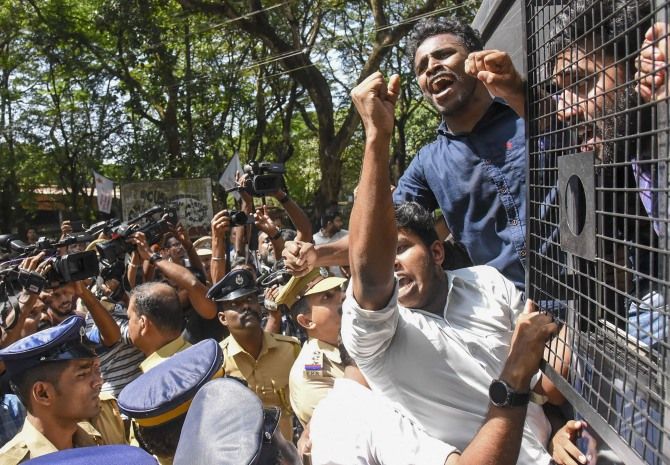
Despite what is said about the space for dissent shrinking, a pushback has come from the people. Do you see a contradiction there because on one hand we say the space for dissent is shrinking while at the same time there are enough examples of spontaneous protests everyday?
I don't think this is contradictory. History is replete with such examples. When the government tries to suppress dissent, people intensify their resistance.
The government is undoubtedly attempting to shut down dissent. This is evident from the police violence in UP, and from what happened in Jamia and JNU, where the universities were attacked with tacit State support.
It is also true that this has had the opposite effect of what the government intended. They would have liked their intimidation to lead to the end of the protests, but it has had the opposite effect.
This has happened many times in the past, both in our country and across the world -- the State tries to repress opposition, and the effect is instead to strengthen it.
A narrative has been created that deems dissent as anti-national and fixes labels like 'tukde tukde' and 'urban Naxals' on dissenters. How will this impact Indian democracy going forward?
I think this is very problematic. For instance, a few months ago more than 500 scientists signed a letter opposing the communications shutdown in Kashmir. At that time, a pro-government YouTube channel put out a show saying that these scientists are anti-national and intelligence agencies should keep a watch on them.
So we have reached a situation where it is impossible to express a simple opinion without having all these conspiracy theories and labels hurled at you. This really vitiates the discourse.
And it is clearly detrimental to the long-term health of our democracy for debates to be conducted on these terms.
The idea seems to be that those who speak in favour of the government -- whatever else they may do -- are considered nationalists and those who oppose the government -- however much they may contribute to society -- are anti-national.
The home minister has said he will not budge an inch. What if despite the protests the government is unrelenting?
I think it is important to realise that the protests have already had a very positive impact in changing the discourse, and I think this matters a lot. Let me list a few examples.
The protests have forced the government on the backfoot and have forced it to announce that the NRC is not an immediate priority.
Even if they are trying to pursue this policy in a different guise, through the NPR, the fact that they have been forced to pause and backtrack at least temporarily shows the positive impact of the protests.
Moreover, various state governments have opposed the NPR which cannot be carried out without their cooperation. That is also a success of the protests. The state governments would not have taken this stance against the central government if their hand had not been forced by the popular mood.
Thirdly, the courts also respond to public opinion; they do not just operate in a vacuum. The protests have pushed the courts also to be more progressive in their recent judgments on civil liberties.
And when this CAA comes up in the Supreme Court, hopefully the court will also take cognisance of the broad popular opposition to this act.
Finally when there is a political change at the Centre, these protest will have built up momentum to push for a reversal of the law.
How long do you think these protests will sustain and continue?
It is difficult to predict how long the protests will continue, but it is worth noting that this also depends on how the government reacts to them.
If it attempts to repress the protests, as it did during the recent attack on universities, this will only extend them.
But regardless of that, the protests have already had a positive impact on the public discourse, and in time to come will have a permanent impact.
This is because the young people who participated in this movement have gained a certain understanding of society and a change in perspective which will have an impact on them for the rest of their lives.
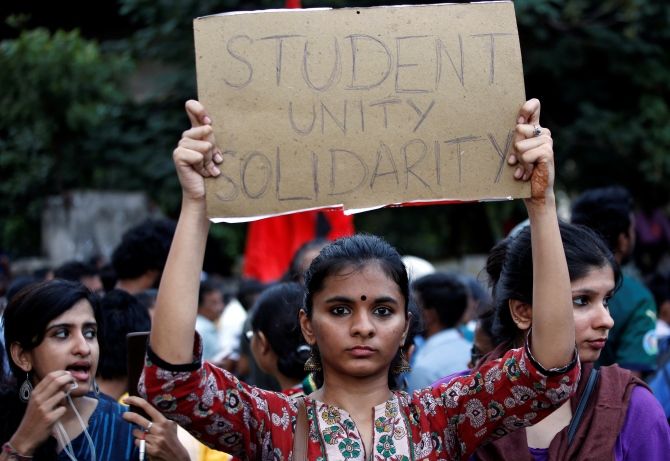
The fiercest opposition to the present government has come from students. What makes these protests so different?
First, I think the scale of the protest is remarkable.
Even students who were apolitical or may have been previously sympathetic to the government have changed their perspectives.
This has changed the discourse and brought back a discussion of many progressive ideas that had taken a backseat, including ideas of secularism, the freedom of speech, and the role of dissent in democracy.
Why were there no similar protests about the detentions and suspension of Internet etc in Kashmir?
The government, after coming to power, has taken several discriminatory and oppressive decisions. It is the culmination of a lot of such decisions that has led to the recent protests.
At some point, people reach a point of no return. When they see successive policies that they are very uncomfortable with, they then take to the streets.
Recently the Bengal governor spoke of nuclear tipped arrows in the Mahabharata. There have been a series of similar comments. How does this impact scholarship and the scientific temper?
It is very sad that someone who holds a important Constitutional post promotes such myths. Moreover, it shows that the governor has not even read the Mahabharata.
There are many aspects of old Indian scholarship, and there are genuine indications of this scholarship that can be found in the Mahabharata itself.
For instance, the understanding of probability and games of chance in ancient India. In the story of Nala and Damayanti, in the Vana Parva, there is a discussion of how games of chance can be analysed systematically, which really has to do with an understanding of the probability theory.
And, in the Virata Parva, there is a famous discussion between Duryodhana and Bhishma on whether the Pandavas had indeed completed their thirteen years in exile.
Bhishma accurately explains the difference between a lunar year and a solar year to Duryodhana and this shows an accurate understanding of astronomy in ancient India.
The governor's statement are not only irresponsible and indefensible, the most tragic part is that they tarnish the attempt to bring out genuine ancient Indian scholarship.
